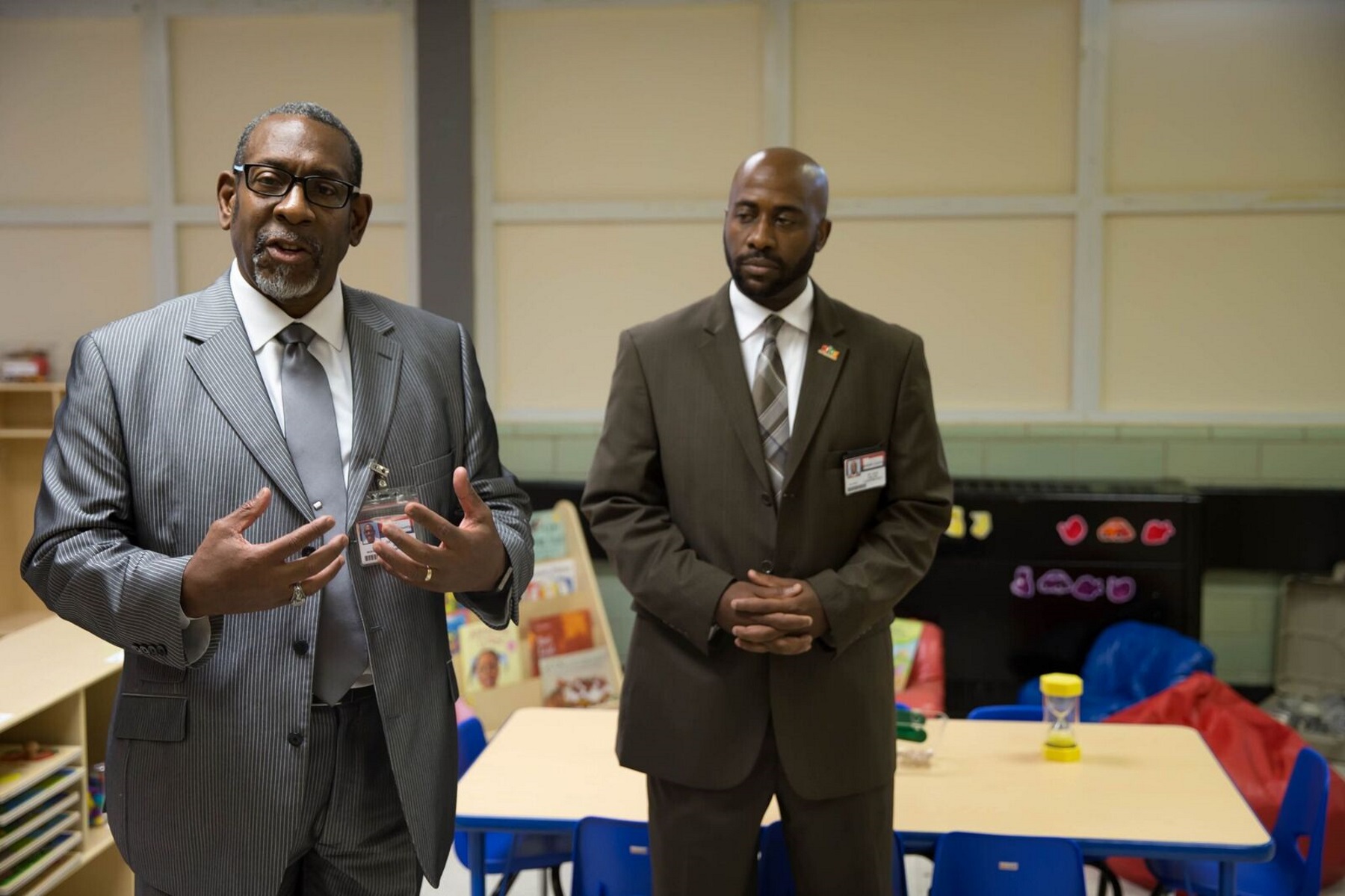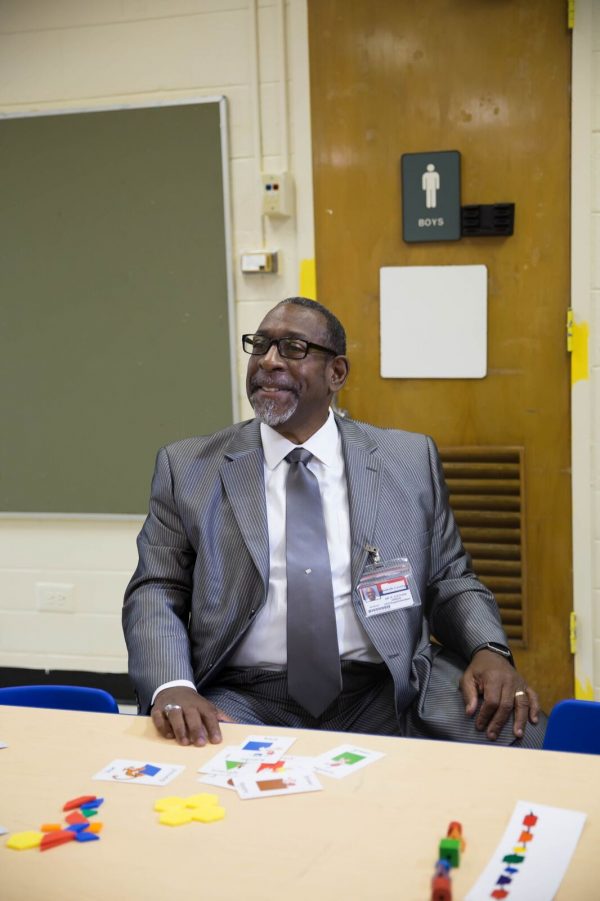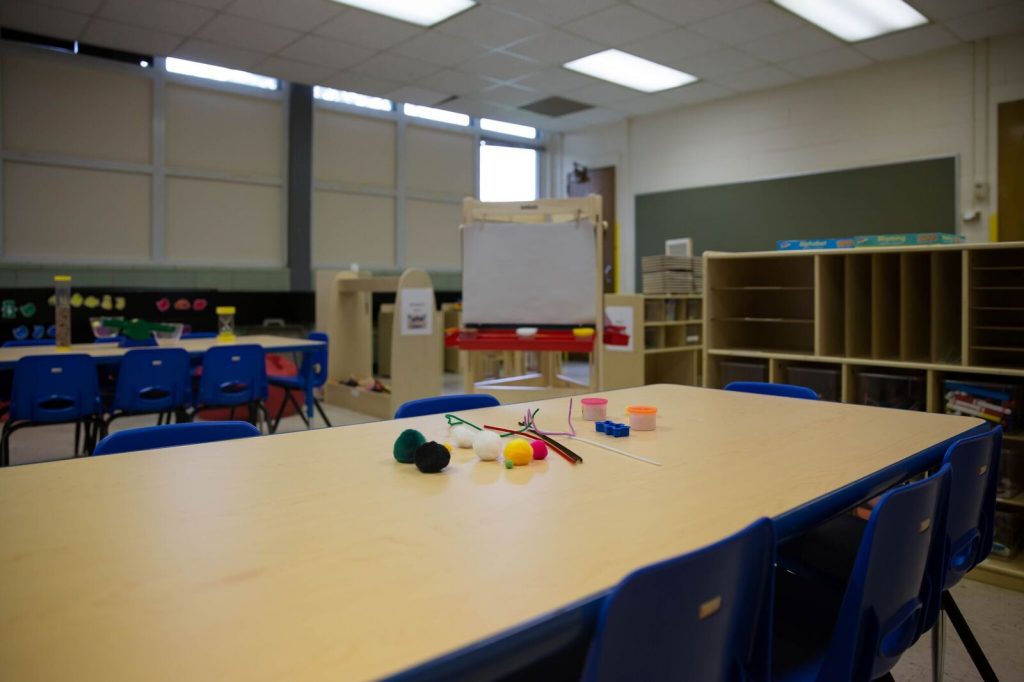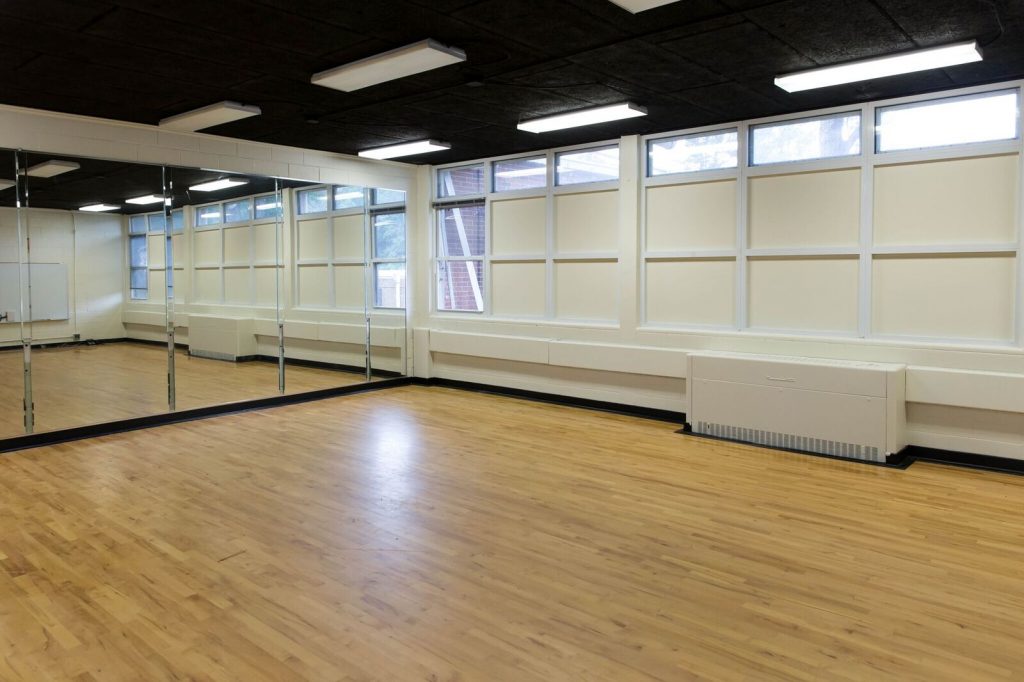Getting Early Start: DeKalb Schools Will Serve 3-Year-Olds This Fall

In June, Superintendent Stephen Green, left, and DeKalb’s coordinator for early childhood education, Dr. Zack Phillips, gave a tour of the new early learning center housed at the former Terry Mill Elementary School.
Ian Palmer / WABE
Two hundred 3-year-olds will zip up their backpacks and head to public school next month. The DeKalb County schools will open a school just for them.
Construction crews have transformed the former Terry Mill Elementary School, south of East Lake Golf Course, into the district’s new early learning center.
The building will eventually serve 3- and 4-year-olds, but it will just enroll 3-year-olds this year.
An Early Start
The idea is to prepare kids for kindergarten, says DeKalb Schools Superintendent Stephen Green.
“The research is very clear that the earlier you get started along the journey, if you do it the right way, with quality, if you do it the right way with social-emotional care as well as academic — a nice blend of that — that students have a greater chance of success as they move through the later years,” he says.
Green is replicating a model he developed when he was superintendent of the Kansas City, Missouri, schools. He says students who completed that program were ready for kindergarten and had few discipline incidents.

“The outcomes for students — in terms of moving into the traditional school environment — they were ready, and they did well in many areas: literacy, math and mainly in their social-emotional readiness to interact with others in the school environment,” Green says.
Expanding access to early education tends to be a popular idea, especially among advocates.
“Providing free child care for 3-year-olds — high-quality child care — is a great idea on the one hand,” says Pam Tatum, president and CEO of Quality Care for Children. “We commend DeKalb County for recognizing how important high-quality child care is for closing the learning gap for children.”
However, Tatum says, the plan could have unintended consequences.
“Infant/toddler care is very expensive, and many child care programs are only able to provide it because the cost is offset by larger groups of 3- and 4-year-olds,” Tatum says.
So, if a lot of 3- and 4-year-olds go to public school, the cost of infant and toddler care could drastically increase for centers and parents, she says.
“My question would be, ‘Where were those 3-year-olds before, and how does this impact the programs that were serving them, and, in particular, infant/toddler care?’” Tatum says.

“The research is very clear that the earlier you get started along the journey… students have a greater chance of success as they move through the later years.”
Stephen Green, Superintendent, DeKalb County Schools
Green says that wasn’t a problem in Kansas City, but he admits it could become a concern in DeKalb once the district opens other similar centers.
“An issue that did arise [in Kansas City] was the quality of day care and the need to establish a higher standard of quality,” Green tells WABE in a statement. “I can imagine that this topic (day care quality/cost) will arise here as we continue to roll out this model.”
Building Community
Some parents are anxious to take advantage of free early education opportunities.
DeKalb School District employee Vincent Dallas came to the campus in person to register his child.
“My son is 3, and I feel like he’s supposed to be in school anyway,” Dallas says. “He’s so smart. I mean, he already knows ABCs, he can count to 30, and I’m paying $120 a week for day care, so it’s time.”

Another issue important to early education advocates is collaboration.
Mindy Binderman is the executive director of the Georgia Early Education Alliance for Ready Students (GEEARS). She says it’s important for the district to develop relationships with other providers in the area.
“The more they can partner with teachers who are teaching kids at 1, 2 and 3 years old, so they understand the expectations DeKalb County has when they get to kindergarten, the better off they all are,” Binderman says.
The district didn’t say whether it has collaborated with other child care centers. However, Green says, DeKalb has partnered with local agencies to offer wraparound services for families.
“[The] Atlanta Food Bank, YMCA, Big Brothers Big Sisters, those organizations and others have pledged themselves to set up shop here as a satellite office to serve the families of the students,” he says.
In a statement to WABE, the school system says: “For years, the DeKalb County School District has offered programs of choice to its stakeholders. The Early Learning Center is the latest program that will provide a high-quality option to parents in DeKalb County. There are hundreds of parents who are searching for quality programs for their young children. We want to be an option for parents, and don’t consider ourselves to be in direct competition with other programs in the county.”
Other Models
Two other metro Atlanta school districts have also expanded early learning options.
Marietta City Schools will open an Early Learning Center for 4-year-olds in August. It will serve 100 students through the state’s lottery-funded pre-K program.
The City Schools of Decatur offers early education for 0-4-year-olds through the district’s College Heights Early Childhood Learning Center. Parents pay tuition for children ages 0-3. The 4-year-old classes are also part of the state’s public pre-K program.
What DeKalb’s Early Learning Center Will Do
- Offer free education for 200 3-year-olds
- Develop and teach its own curriculum
- Employ teachers certified in early childhood education
- Pay teachers on the DeKalb County Schools’ salary schedule
- Provide wraparound services for families
- Offer after-school care (starting the second year)
- Offer extended-year instruction (after the second year)
- Loop classes, starting the second year (students will have the same teacher as 3- and 4-year-olds)
- Have a 2:15 teacher/student ratio
What It Won’t Do
- Provide transportation (at least during the first year. The district has applied for grants to help pay for transportation, Green said.)








